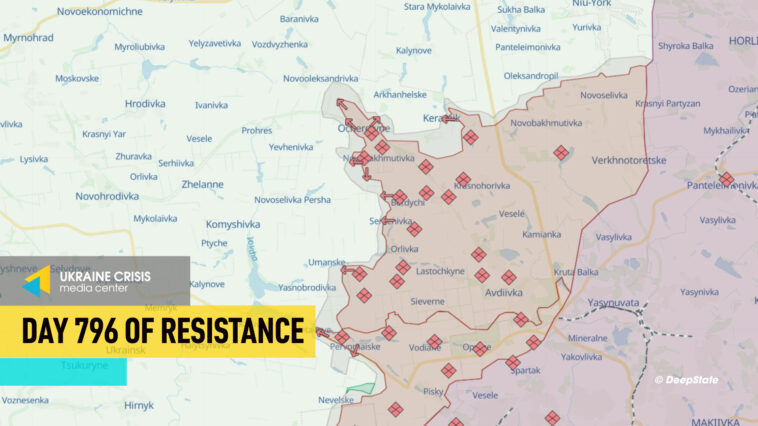Will Ukrainian withdrawal from west of Avdiyivka facilitate Russia’s gains? ISW’s analysis. Ukraine works on a bilateral security agreement with the U.S. Polish farmers lift blockade of all border crossings with Ukraine.
Will Ukrainian withdrawal from west of Avdiyivka facilitate Russia’s gains? ISW’s analysis
Commander-in-Chief of the Armed Forces of Ukraine, Colonel General Oleksandr Syrskyi reported on April 28 that Ukrainian forces withdrew from Berdychi (northwest of Avdiivka) and Semenivka (west of Avdiivka) to positions further west in order to preserve Ukrainian personnel. These withdrawals have yet to facilitate rapid Russian tactical gains, the Institute for the Study of War (ISW) said in a report on April 28.
Russian forces remain unlikely to achieve a deeper operationally significant penetration in the area in the near term.
Russian forces have not made relatively rapid tactical gains west of Ocheretyne, Solovyove (northwest of Avdiivka), Berdychi, and Semenivka following Ukrainian withdrawals from limited tactical positions in the area, however, suggesting that Ukrainian forces maintain positions and capabilities in the area that are slowing further westward Russian advances for the moment, ISW said.
Russian forces will likely continue to make tactical gains in the Avdiivka direction in the coming weeks, and Ukrainian commanders may decide to conduct additional withdrawals if Russian forces threaten other Ukrainian tactical positions in the area.
The next line of defensible settlements in the area is some distance from the Ukrainian defensive line that Russian forces have been attacking since the seizure of Avdiivka in mid-February 2024, although Ukrainian forces may be able to use defensible windbreaks in fields immediately west of the current frontline to slow future Russian attacks.
The complete Ukrainian withdrawal to reportedly fortified positions further west of Avdiivka would likely allow Russian forces to make relatively rapid advances through these fields, although the advances would likely be rapid only if Ukrainian forces do not try to hold positions in the fields.
Syrskyi added that Ukrainian forces are committing elements of brigades that have undergone rest and reconstitution to stabilize the situation in the Avdiivka direction, ISW said. The arrival of reconstituted Ukrainian reinforcements will likely allow Ukrainian forces to slow Russian tactical gains and possibly stabilize the front.
Ukrainian forces have struggled with under-resourcing and are facing a reported one-to-three manpower disadvantage northwest of Avdiivka, but have nonetheless prevented more than a division’s worth of Russian combat power from making the types of advances that these force and materiel disparities should in principle have allowed Russian forces to achieve.
The arrival of Ukrainian reinforcements and additional materiel will force the Russian command to either accept that a near-term wider or deeper penetration is unlikely or commit additional reserves to the area to continue pursuing tactical gains. Russian forces currently have opportunities to achieve operationally significant gains near Chasiv Yar and are preparing reserves to support a large-scale offensive effort expected this summer.
The immediate commitment of additional Russian reserves to an opportunistic tactical penetration in the Avdiivka area, where Russian forces are far away from operationally significant objectives, may consume manpower that otherwise could support operationally significant gains in the Chasiv Yar area or that were intended for use in summer 2024. Russian forces will likely have to decrease the tempo of offensive operations west of Avdiivka if they do not commit additional reserves, which would likely constrain Russia’s ability to make additional rapid tactical advances in the area, the report reads.
Ukraine works on bilateral security agreement with U.S.
Ukraine and the U.S. are working on a bilateral security agreement. The text of the document is in the works, Ukrainian President Volodymyr Zelenskyi said in his nightly address on Sunday.
“Our goal is to make the agreement the strongest of all. We are discussing a precise basis for our security and cooperation. We are working to cement specific support for this year and the next 10 years. It includes weapons, financial and political support, and joint weapons production,” Zelenskyi said.
He added that the accord will be “exemplary,” so as to reflect the power of U.S.’s leadership.
“I am grateful to our team and the U.S. team for the progress in formulating the agreement,” he said.
Ukraine has now signed separate bilateral security agreements with nine countries: the UK, Germany, France, Denmark, Canada, Italy, the Netherlands, Finland and Latvia.
Polish farmers lift blockade of all border crossings with Ukraine
Truck traffic has resumed at the Rava-Ruska – Hrebenne border crossing point between Ukraine and Poland as Polish farmers ended their blockade of the crossing on Monday, Poland’s border agency said.
Trucks pass in both directions according to regular processes.
This means that Polish protesters have unblocked all border crossings with Ukraine, Ukraine’s State Border Guard Service said in a statement.
At the same time, the trucks transporting grain products will not be allowed into Poland. These goods can only transit the country.
There are no trucks in Poland waiting to get access to Ukraine, Ukraine’s State Border Guard Service said. Trucks are moving out of Ukraine according to an electronic registration in the line.
PACE recognized Putin as illegitimate. Ukraine in Flames #604
In this episode of Ukraine in Flames, we discuss the complex interplay between international politics, legal frameworks, and diplomatic relations. This episode’s guests delve into the ramifications and positives of the Parliamentary Assembly of the Council of Europe’s decision regarding Putin’s illegitimacy, Putin’s international standing or lack thereof, and the potential legal consequences he might face. The dialogue explored themes of terminology, legitimacy, and the balance between upholding obligations and addressing violations in international relations. Watch UIF #604 to learn more about what PACE’s recent designations and statements mean, and what consequences this could have for Russia.
Guests:
- Andriy Yakovlev, lawyer, managing partner at Umbrella Law Firm
- Oleksandr Chupak, Head of Economic Programs at the Ukrainian Center for Strategic Studies




